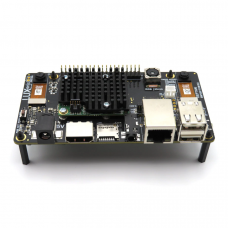OAK-D-CM3, OpenCV AI Machine Vision Kit, Depth Measuring, Image Recognition
Overview : Based on the Raspberry PI CMIO board, the OAK-D-CM3 (BW1097) combines a host and the OAK-SoM to allow for fully integrated solution for real-time spatial AI.
Hardware specifications :
|
Camera Specs |
Color camera |
Stereo pair |
|---|---|---|
|
Sensor |
IMX378 |
OV9282 |
|
DFOV / HFOV / VFOV |
81° / 69° / 55° |
82° / 72° / 50° |
|
Resolution |
12MP (4032x3040) |
1MP (1280x800) |
|
Focus |
Auto-Focus: 8cm - ∞ |
Fixed-Focus: 19.6cm - ∞ |
|
Max Framerate |
60 FPS |
120 FPS |
|
F-number |
2.0 |
2.2 |
|
Lens size |
1/2.3 inch |
1/4 inch |
|
Pixel size |
1.55µm x 1.55µm |
3µm x 3µm |
Myriad X inside : This OAK device has on-board Myriad X VPU Main features:
4 TOPS of processing power (1.4 TOPS for AI)
Run any AI model, even custom architectured/built ones - models need to be converted.
Encoding: H.264, H.265, MJPEG - 4K/30FPS, 1080P/60FPS
Computer vision: warp/dewarp, resize, crop via ImageManip node, edge detection, feature tracking. You can also run custom CV functions
Stereo depth perception with filtering, post-processing, RGB-depth alignment, and high configurability
Object tracking: 2D and 3D tracking with ObjectTracker node
Depth perception : This OAK camera has a baseline of 9.0cm - the distance between left and right stereo camera. Minimal and maximal depth perception depends on camera FOV, resolution, and baseline
Min perceivable distance: ~20cm (400P, extended), ~40cm (400P OR 800P, extended), ~80cm (800P)
Max perceivable distance: ~35 meters
Extended means that StereoDepth node has Extended disparity mode enabled.
Dimensions and Weight :
Width: 110 mm
Height: 60 mm
Length: 27 mm
Weight: 101g
Getting started :
The OAK-D-CM3 accepts 5V (+/-10%) from a 5.5m x 2.5mm barrel jack. Raspberry PI USB boot can be accessed by setting a header jumper, which allows initial flash of eMMC on CM3/CM3+. Alternatively the microSD slot can be used with a bootable system image. The Raspberry PI JTAG header is not populated by default, but can be added, allowing JTAG access.
The reset button resets the OAK-SoM only. To reset the CM3/CM3+, ground the RUN header via to the GND header via.
The PWR LED indicates “power good” for the BW1097 on-board PMIC. The ACT LED indicates activity on the CM3/CM3+ device. Other indicator LEDs exist for the two USB2.0 Type A ports and for the 10/100 Ethernet port.
Links Related to OAK-D-CM3 : Brochure
Enter the code in the box below:




